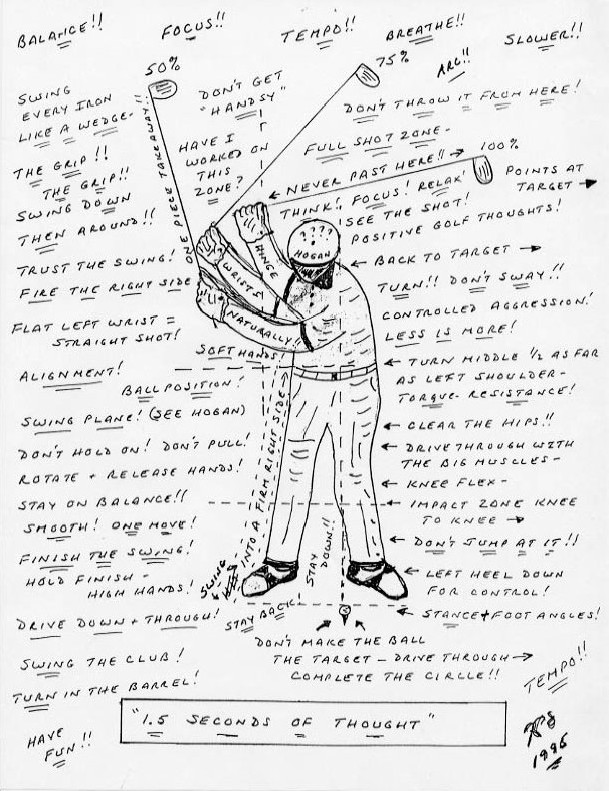By now you’re all familiar with my learning golf on Brooks Brothers’s simulator. In fact, when comment-leaver “woofboxer” was visiting New York recently, he knew right where to find me.
Apparently I’m one of a diminishing number of adults inclined to take up the sport later in life. Golf has lost 5 million players over the past decade, especially among young people, and the industry is seriously concerned. So last week new initiative called Hack Golf was launched. Its founders are asking the golfing public how to make the sport more fun.
“More fun?” I respond in a piece that runs on the op-ed pages of today’s Wall Street Journal. “Whoever said golf was supposed to be fun?”
Is learning the violin fun? Is becoming a competitive chess player fun? Minigolf, with its colored balls and Ferris wheels, is fun. But the satisfaction derived from real golf is much more profound than the word “fun” would suggest. Golf is something like rock climbing, except the risk is not a shattered back but a bruised ego.
It’s for those who, however laid back they might otherwise be, have an alpha streak that keeps them impervious to the ritual humiliation the sport inflicts. Golf is beyond fun: It is the ultimate sporting test of physical coordination, mental focus, strategy and nerves. “It takes a special kind of person to play golf,” an instructor at Golf Manhattan once told me, since for those who take it up later in life, “it’s just too hard.”
Head over here to access the full essay. — CC
[yop_poll id=”27″]
Update: In case you encounter a pay wall using the link above, here’s the text of the piece:
Whoever Said Golf Was Supposed To Be Fun?
Gimmicks to appeal to young people send the wrong message. Face it, the sport is cruel.
By CHRISTIAN CHENSVOLD
It’s for those who, however laid back they might otherwise be, have an alpha streak that keeps them impervious to the ritual humiliation the sport inflicts. Golf is beyond fun: It is the ultimate sporting test of physical coordination, mental focus, strategy and nerves. “It takes a special kind of person to play golf,” an instructor at Golf Manhattan once told me, since for those who take it up later in life, “it’s just too hard.”
Golf will always be an elite sport, but not in the old-fashioned way of country-club expense and exclusivity. Municipal courses are affordable on even a modest income, and cheap clubs are easily found on eBay. Those willing to wade through conflicting teaching methodologies will find a lifetime supply of free instruction on YouTube.
Today’s golf elitism comes down more to individual temperament, and part of that is shaped by the age in which we live. Technology has made acquiring equipment and absorbing information easier than ever. But it may also have eroded our collective willingness to take up long-term challenges, since, for some, learning golf will be the equivalent of enrolling in 10 years of medical school. Is golf hard? Damn hard, but today’s taskmaster is more likely Father Time than Old Man Par.
During the presentation, Ted Bishop, president of the PGA of America, wondered how to deliver 30-, 60- or 90-minute golf experiences to consumers—however much time they’re willing to carve out between texting, Facebooking and watching movies on their phone—yet admitted that golf doesn’t currently offer such a product. A slow round of golf is asking a lot of today’s young people, whose idea of fun is probably not six hours of painstaking frustration. The ancient game of golf (the modern game goes back to 15th-century Scotland) may simply be incompatible with 21st-century lifestyles, in which case the fault lies not in the sport, but in ourselves. The golf gods are cruel, and to ask the game to meet us on our terms rather than us on the game’s terms could bring about divine retribution through a nationwide plague of lipped-out putts.
In my case, however, it was technology that introduced me to golf. At age 41 I hit my first ball on the high-tech simulator at Brooks Brothers in midtown Manhattan and was instantly hooked—or rather sliced. To get young people involved, perhaps simulators, with their video-game-like interaction, could be installed in high-school gyms along with practice mats and nets. The train-’em-young-and-indoors approach is certainly working in Korea. Adolescents are also less self-conscious about learning physical movements than middle-aged adults, and are already in the mode of studying challenging things like trigonometry and foreign languages.
As for those over 34, there’s a quote I can’t find—something ubermenschy and from someone like Nietzsche or Baudelaire —about “superior beings” deriving pleasure from things that are difficult and challenging. Perhaps the National Golf Foundation needs to sponsor a “Have you got what it takes?” campaign aimed at Type-A overachievers. Using Armed Forces recruitment strategies makes more sense to me than sugarcoating the challenge of golf with a fabricated fun factor. “If you think golf is relaxing,” Bob Hope once said, “you’re not playing it right.”











Jazz, football, squash, racquet ball…now golf.
Anything else in store for those of us who thought that Ivy Style was about clothing?
Respect for new found hobbies and interests but try as I might, golf always seemed less Caddyshack and more an “older frat bro sport” to me. I think George Carlin said it best (NSFW):
http://georgedpcarlin.wordpress.com/2012/03/19/george-carlin-on-golf/
@Curmudgeon
There’s a clothing post planned for Saturday. It’s pegged on Black History Month.
You’ll enjoy it.
Golf is great for the old; the fat; the unemployed; the drunk; the climbers; and the unathletic. Its appeal as a once-exclusive and aristocratic sport long ago attracted crowds who tarnished that appeal, which was really all it had going for it, along with the fact that business was often conducted on the greens, which hasn’t been true for at least 2 decades now. I was forced to play golf as a child, like all well-bred children, and found it then as I do now unimaginably boring.
@Christian
I’m sure I’ll enjoy it!
Jewish History Month might be more relevant to Ivy style.
This might be of interest:
http://www.tabletmag.com/jewish-life-and-religion/90220/school-ties-2
I’ve never been interested in golf, seemed too long and boring. But, I’ve also been told that it’s a beneficial professional skill. Maybe one day, when I have the extra money and time. Also, when I’m important enough to hob knob with business partners on the golf course.
@ Curmudgeon
Thanks kindly for the link- the comments were especially interesting.
What is all this tedious sport shit?
Football post on Super Bowl Sunday!
@Christian: Perhaps the quote you are searching for is John Stuart Mill’s “it is better to be a human being dissatisfied than a pig satisfied; better to be Socrates dissatisfied than a fool satisfied.”
Is rock climbing a traditionally ivy activity? Most of the people I meet that practice it are distinctly not of that culture. The lone exception that springs to mind is Yvon Chouinard, who looked impeccable even on the face of a giant cliff.
I do believe, though, that one of the secrets to a happy life is to challenge yourself constantly.
A good walk spoilt? I’ve never really had the time for it. It seems far too all consuming, I worked in an office for six months where everyone played, they talked of nothing else and their mood on a Monday morning was determined by their golf performance over the weekend. The first two hours was always a stroke by stroke debrief. I was glad to get out of there.
There’s no inherently preppy or Ivy or WASPy sport. It’s what the person brings to it. I know men who could make basketball seem like on old school WASP pastime, which, at a first glance, seems impossible.
Loud, greasy hedge fund managers can transform crew or squash or sailing into something altogether to-be-avoided.
What am I saying? “can”? Have.
In the spirit of S.E.’s observation, the same might be said of Ivy clothes as of Ivy sports. It’s what you bring to it. Attending a prep school or an Ivy college is no guarantee that any individual will turn out ethical, or educated, or even mannered.
@S.E. & RJG, excellently said. What you say is very rarely understood.
The most enjoyable content in this post is Curmugeon’s link to Diamond’s piece on “School Ties.”
As I get older, Golf is more attractive. I have the patience and determination now. It can be competitive– you play against others or you play against yourself. You get to whack things with a stick (hey! whacking things with a stick is great!). It’s meditative. Maybe they should court us oldies (post 45ers)– we have time, patience, and money.